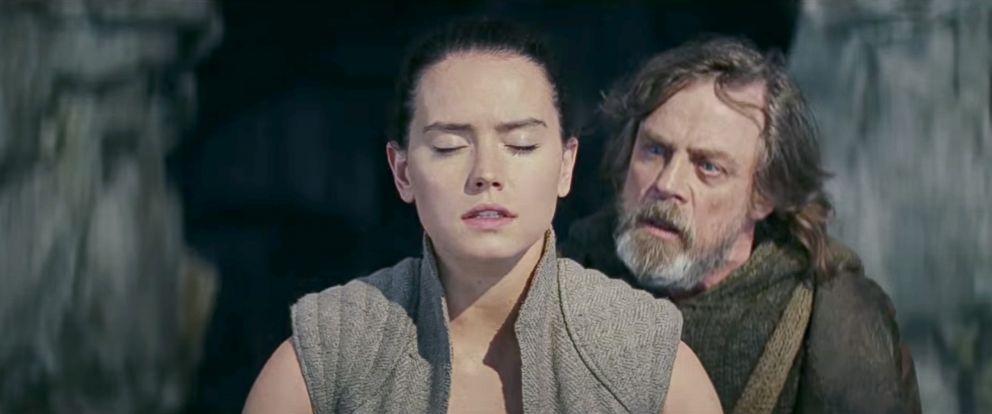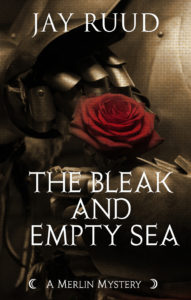Star Wars: The Last Jedi
Rian Johnson (2017)
[av_image src=’http://jayruud.com/wp-content/uploads/2014/12/3-12.jpg’ attachment=313′ attachment_size=’square’ align=’left’ animation=’left-to-right’ link=” target=” styling=” caption=’yes’ font_size=” appearance=’on-hover’]
Three Tennysons/Half Shakespeare[/av_image]
[av_textblock size=” font_color=” color=”]
Just in case you’ve been living in a cave for the past several months, let me inform you that the eighth installment in the Star Wars franchise, subtitled The Last Jedi, was released this past weekend, grossing $220 million domestically and close to half a billion dollars worldwide. The film premiered on 4,232 screens in the United States and Canada, averaging a whopping $52,000 per screen. It was the second largest opening weekend in history. The largest? This film’s immediate predecessor in this third trilogy, Star Wars: The Force Awakens. Critics have been kind to the film, giving it a 93 percent rating on Rotten Tomatoes.com, but only 56 percent of audience reviewers have given it a positive ranking. This kind of discrepancy always really interests me, as I try to puzzle out what it is critics like that audience members don’t, or what the viewers dislike that critics are unconcerned about.
In the case of The Last Jedi, many of the complaints are coming from longtime Star Wars devotees who feel that the new film does not satisfactorily answer concerns they’ve been obsessing about on social media for two years: Just who is this Snoke who rules the First Order like a new emperor, and employs Kylo Ren as his new Vader? And who exactly are Rey’s parents? Turns out The Last Jedi is far less concerned about these plot points than Star Wars’ most ardent fans are. Further The Last Jedi allows for some new and unusual power of the Force that may seem freaky to longtime fans—Rey and Kylo Ren can communicate closely over long distances in ways that far exceed Luke’s being able to “sense” what Leia may be thinking from far away, and by the same token Luke and Leia see to have powers we haven’t seen before. Who knew? More importantly, there is a good deal of concern among fans about the character arcs of certain cherished characters, Luke in particular.
Of course, there is also a hint of grousing over the loss of white male privilege in the disgruntled posts about this long ago and far away Star Wars galaxy. Not only is the New Hope in this final trilogy a woman, Rey (Daisy Ridley), but the one white male figure among the current crop of heroes, the X-Wing pilot Poe Dameron (Oscar Isaac) turns out to be wrong about almost everything and is considered a “trigger-happy flyboy” by the two nasty women who outrank him, Princess Leia (the sorely-grieved Carrie Fisher) and her second in command, Vice Admiral Amilyn Holdo (Laura Dern). It is not lost on fans who resent this development that the two chief villains in the piece, Kylo Ren (Adam Driver) and his chief rival General Hux (Domhnall Gleeson) are white males set on power and universal dominance.
On one hand, the film pays tribute to George Lucas’s original trilogy with scenes and situations that recall and parallel those films, particularly The Empire Strikes Back and Return of the Jedi: AT-Ats attack a rebel base on a snow-covered planet—though it turns out that the white stuff this time is actually salt rather than snow. A young Jedi travels to a distant planet to find a Jedi master, but this time Luke Skywalker is the master, not the student. A crucial, climactic scene before the throne of the supreme leader is fought out between Jedi adherents of the Dark Side and the Right Side of the Force, but it ends in a way that no one is likely to have anticipated. Yet despite these tributes to the past, the thrust of this film is in a new direction. Kylo insists to Rey that she must “Let the past die. Kill it if you have to. That’s the only way to become what you were meant to be.” And in a highly symbolic gesture, when Snoke (Andy Serkis) chides Kylo by saying “You’re not Vader. You’re just a child in a mask,” Kylo responds by removing his Vader-like helmet and smashing it. For many Star Wars fans, that is precisely the image of what Johnson is doing in this film. For critics, the act is the knell of freedom from the heavy weight of the franchise’s history and an announcement of a new direction.
Writer-director Rian Johnson (Looper) intertwines three plot threads, each one focusing on one of the three new resistance heroes introduced two years ago in the trilogy’s first film, The Force Awakens: The film opens where the first one ended, as Rey has taken it upon herself to seek out the last surviving Jedi master, Luke Skywalker (Mark Hamill) on a remote planet where he lives in seclusion, in order to be trained in the Fore and oh, by the way, to get him to stop brooding and rejoin the Resistance, which can use all the Jedis it can get. Luke, however, is licking his wounds after his failure in training Ben Solo, now the Dark Side’s own New Hope, Kylo Ren.
Meanwhile, General Hux is busy trying to crush the last of the Resistance. After Poe wins a pyrrhic victory that sacrifices much of the fleet, he’s demoted by Leia, now commanding the Resistance The remnant of the rebel army is now forced to flee across the galaxy, pursued by Hux’s great warships, which are now in possession of a device that allows them to track rebel ships through hyperspace.
But never fear, the ex-Stormtrooper Finn (John Boyega) is sent with his not-so-secret admirer Rose Tico (Kelly Marie Tran) off to another remote planet in order to find a rumored “codebreaker” who can help them infiltrate Hux’s flagship and disable the new tracking device. Turns out they end up imprisoned but find a codebreaker in the form of a fellow prisoner Benicio del Toro, who is, you might say, the Lando Calrissian of the new trilogy.
Anything more I say will only bring about spoilers, which I don’t want to do, though it seems likely that most people reading this will have already seen the movie. I will say that visually the film is often very striking: One such scene is the one in which Kylo, Rey and Supreme Leader Snoke reprise the Emperor-Luke-Vader climax of Return of the Jedi with a new twist. But in the other most memorable scene of the film Rey, in training with Jedi Master Luke, reenacts the scene in Empire when as Yoda’s trainee Luke enters the swamp cave on Dagobah and envisions a battle with Darth Vader in which his own face appears on Vader’s severed head. Here, Rey enters a dark cave on Luke’s island and, as she questions her parentage, receives a vision of herself as if placed between two mirrors, so that all she sees are reflections of herself, stretching on into infinity. Both scenes, of course, are versions of the mythic descent into the underworld, going back as far as Homer’s Odysseus, in which the hero, descending into a darkness representing his/her own unconscious, meets his/her greatest fear or weakness—what psychologist Carl Jung called the “shadow” archetype, and, overcoming or assimilating it, emerges a whole and mature warrior. Johnson has acknowledged the parallel in the two scenes, and commented in an interview, “she descends down into there and has to see, just like Luke did in the cave, her greatest fear. And her greatest fear is [that], in the search for identity, she has nobody but herself to rely on,” Johnson said. That’s something of an oversimplification, and no doubt viewers will interpret the scene in deeper ways as they see fit, but in any case the scene is a turning point for Rey’s character, and perhaps for the entire Star Wars franchise.
This film is definitely worth seeing even if you aren’t a Star Wars fan. Driver is convincing as the brooding, troubled representative of the Dark Side, struggling with his inner demons. Ridley as Rey is equally conflicted, drawn to Kylo but committed to the rebellion. Isaac has his own struggles, mainly with accepting that the women might be right sometimes. Mark Hamill also has his inner struggles as Luke, and does the most impressive acting of his career here. As for the late Carrie Fisher, while you might experience a pang of grief every time she appears onscreen, in her quiet power and dignity as she, too, struggles to keep the flame of hope alive as commander of the rebel forces she is herself very much alive.
The film is a bit too long at two and a half hours, but still, I think is worth three Tennysons and half a Shakespeare, and it will be fascinating to see just what new direction this franchise will take now that the past has been transcended.
NOW AVAILABLE:
If you like these reviews, you might enjoy Jay Ruud’s most recent novel, now available from the publisher at https://encirclepub.com/product/the-bleak-and-empty-sea/. Also available from Amazon or Barnes and Noble.
When word comes to Camelot that Sir Tristram has died in Brittany of wounds suffered in a skirmish, and that his longtime mistress, La Belle Isolde, Queen of Cornwall, has subsequently died herself of a broken heart, Queen Guinevere and her trusted lady Rosemounde immediately suspect that there is more to the story of the lovers’ deaths than they are being told. It is up to Merlin and his faithful assistant, Gildas of Cornwall, to find the truth behind the myths and half-truths surrounding these untimely deaths. By the time they are finally able to uncover the truth, Gildas and Merlin have lost one companion and are in danger of losing their own lives.
https://oleoalmanzora.com/oleoturismo-en-pulpi/ Pre-order from Amazon here: https://www.amazon.com/Bleak-Empty-Sea-Tristram-Mystery/dp/1893035735/ref=sr_1_1?s=books&ie=UTF8&qid=1503328086&sr=1-1&keywords=Bleak+and+Empty+Sea
https://www.circologhislandi.net/en/conferenze/ Pre-order from Barnes and Noble here: https://www.barnesandnoble.com/w/the-bleak-and-empty-sea-jay-ruud/1126958139?ean=9781893035737


